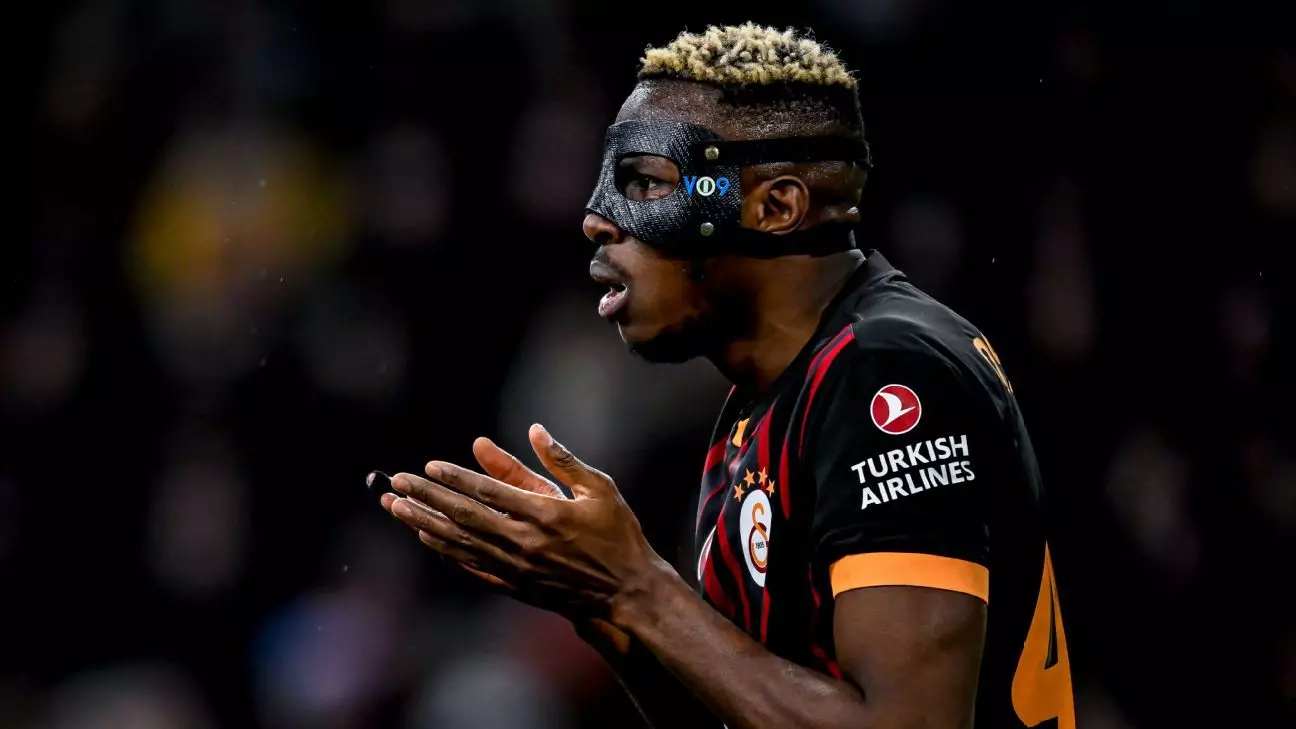The January transfer window often serves as a beacon of hope for players and clubs alike, marking a critical juncture in the football season. For Nigerian players, there was a particular anticipation surrounding this window, fueled by the prospects of impactful moves that could redefine careers. However, as the dust settled, it became clear that expectations were largely unmet, leaving fans and analysts pondering the implications of these decisions.
Perhaps the most noteworthy story was that of Victor Osimhen, the Nigerian striker whose impressive displays have captivated the football world. Osimhen’s prior successes at Napoli and his recent loan to Galatasaray had set the table for a promising transfer—a notion that, unfortunately, did not come to fruition. His name was tossed around in links to some of Europe’s most storied clubs, such as Manchester United and Barcelona. Despite accumulating an impressive tally of 16 goals and 6 assists in just 19 matches this season, Osimhen’s hefty 75 million Euros release clause has proven to be an insurmountable barrier for clubs looking for a bargain.
Much ink was spilled regarding Osimhen’s future, with many speculating whether the 26-year-old would be part of a larger transfer narrative, perhaps stepping into the spotlight at a more prominent European club. While Juventus showed genuine interest—given the connection with their director, Cristiano Giuntoli—financial considerations regarding existing squad members, particularly Dusan Vlahovic, complicated matters.
In contrast to Osimhen, Victor Boniface seemed poised for a storied chapter, with rumored moves to Al Nassr to join Cristiano Ronaldo leading to soaring expectations. The perceived magnitude of this transfer galvanized fans in Nigeria, as social media buzzed with calculated figures of prospective wages converted into naira, a reflection of national pride intertwined with player success. Unfortunately, what seemed like a done deal quickly unraveled. Boniface’s reported agreement and medical clearance had fans euphoric until Al Nassr pivoted to secure Aston Villa’s Jhon Duran.
Despite the turbulence, Boniface displayed commendable professionalism by reaffirming his commitment to Bayer Leverkusen, emphasizing his loyalty and desire to help secure the team’s objectives. This exemplifies a mature approach in professional sports, recognizing that ambition can be balanced with commitment to one’s current responsibilities.
Interestingly, not all narratives centered around stunted ambitions; Kelechi Iheanacho found a new home after a challenging spell in Spain. Returning to the Championship with Middlesbrough, he looks to revitalize his career after a forgettable time at Sevilla. His transition back to England is not just exciting; it reflects the cyclical nature of football careers. Amidst talks of interest from clubs like Leeds United and Celtic, it was Boro that proved strongest in their pursuit, perhaps identifying the potential for a resurgence in form that could benefit all parties involved.
Iheanacho is a reminder that while the pursuit of grandeur is enticing, sometimes regaining a foothold in familiar territories can lead to rejuvenated performances. His journey can serve as an inspiration for other players looking to navigate challenging career trajectories—highlighting that persistence and adaptability are essential in professional football.
While the narratives surrounding Osimhen and Boniface dominated headlines, other Nigerian players also made significant strides during this window. Gift Orban’s transfer from Lyon to TSG Hoffenheim illustrates the ongoing evolution of international talent in Europe. Even with a modest scoring record at Lyon, Orban’s move for up to 12 million Euros, contingent on performance, signifies faith in his capabilities as a rising star.
Orban’s immediate impact at Hoffenheim, scoring in his debut, highlights how fresh opportunities can reignite a player’s career. Additionally, Bruno Onyemaechi’s move to Olympiakos underscores the growing international appeal of Nigerian players, reflecting their contributions on a broader stage. Meanwhile, Daniel Daga, showing promise at just 20, has made his move to Molde FK, offering hope for the future of Nigerian football.
The January transfer window for Nigerian players serves as a complex tapestry of high aspirations and stark realities. While players like Osimhen and Boniface encountered obstacles in their ambitions, others such as Iheanacho, Orban, and Onyemaechi are forging paths that can enrich their careers. This blend of experiences—both disappointing and promising—illustrates the unpredictable nature of football, yet reinforces the importance of resilience and adaptability amidst adversity. As the season progresses, fans will be left to ponder the implications of these moves and the future trajectories of their favorite players.

